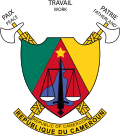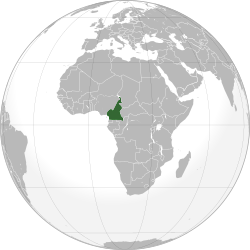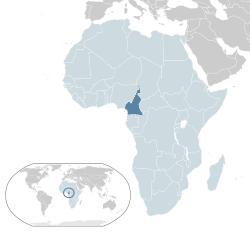Republic of Cameroon République du Cameroun (French) | |
|---|---|
| Motto: "Paix – Travail – Patrie" (French) "Peace – Work – Fatherland" | |
| Anthem: "Chant de Ralliement" (French) "The Rallying Song" | |
| Capital | Yaoundé 3°52′N 11°31′E / 3.867°N 11.517°E |
| Largest city | Douala |
| Official languages | English French |
| Ethnic groups (2022) |
|
| Religion (2022) |
|
| Demonym(s) | Cameroonian |
| Government | Unitary dominant-party presidential republic under a dictatorship |
| Paul Biya | |
| Joseph Ngute | |
| Marcel Niat Njifenji | |
| Cavayé Yéguié Djibril | |
| Legislature | Parliament |
| Senate | |
| National Assembly | |
| Formation | |
| 17 August 1884 | |
Partition | 20 July 1916 |
Independence of French Cameroon from France | 1 January 1960 |
Independence of Southern Cameroons from the United Kingdom, establishment of federal republic | 1 October 1961 |
Unitary state | May 1972 |
| Area | |
Total | 475,442 km2 (183,569 sq mi) (53rd) |
Water (%) | 0.57 |
| Population | |
2024 estimate | 30,966,105 (52nd) |
Density | 39.7/km2 (102.8/sq mi) |
| GDP (PPP) | 2024 estimate |
Total | |
Per capita | |
| GDP (nominal) | 2024 estimate |
Total | |
Per capita | |
| Gini (2021) | medium inequality |
| HDI (2022) | medium (151st) |
| Currency | Central African CFA franc (XAF) |
| Time zone | UTC+1 (WAT) |
| Date format | dd/mm/yyyy yyyy/mm/dd |
| Calling code | +237 |
| ISO 3166 code | CM |
| Internet TLD | .cm |
| |
Table of Contents
Introduction to Data Protection in Cameroon
The significance of data protection and privacy laws in Cameroon cannot be overstated, particularly in today’s digital landscape, where personal information is frequently collected, processed, and stored by various entities. The increasing digitization of services and the rapid growth of internet usage have precipitated a pressing need for robust legal frameworks that safeguard individuals’ rights concerning their personal data. Historically, the concept of data protection in Cameroon has evolved significantly, influenced by global trends and local needs.
In the early 2000s, awareness regarding the importance of data privacy began to gain traction, primarily prompted by advancements in technology and communications. However, it wasn’t until the mid-2010s that Cameroon saw the emergence of more structured data protection laws. The enactment of specific regulations aimed at protecting individual privacy rights was a crucial step toward aligning with international standards, especially given the rise of the digital economy. These laws serve not only as a means of defending citizens against unauthorized data use but also play a vital role in fostering trust between businesses and consumers.
As the digital landscape continues to expand, the relevance of data protection laws in Cameroon becomes increasingly pronounced. Individuals’ rights to control their personal data must be firmly established to adapt to the fast-paced technological advancements that characterize the current era. Legislators and stakeholders must consider the complexities arising from the intersection of technology and privacy, ensuring that Cameroonian laws remain responsive to both local and global dynamics. In essence, the evolution of data protection in Cameroon embodies a critical balancing act between innovation, privacy, and consumer rights, positioning the country to meet future challenges and opportunities in the realm of data governance.
Legal Framework Governing Data Protection
The legal framework governing data protection in Cameroon is primarily defined by various national laws, regulations, and government initiatives designed to safeguard personal data and ensure privacy. At the core of these efforts is Law No. 2010/012 of 21 December 2010 on Cybersecurity and Cybercriminality, which establishes fundamental principles surrounding data protection. This law provides guidelines on data processing, the rights of individuals, and the responsibilities of data controllers and processors.
In addition to this foundational law, Cameroon has also developed regulatory measures that align with the African Union’s Convention on Cyber Security and Personal Data Protection, which emphasizes the need for consistent data protection standards across the continent. These regulations emphasize the importance of consent, transparency, and the right to access personal data, creating a robust framework for individuals to exercise their rights concerning personal information.
The Ministry of Posts and Telecommunications plays a crucial role in implementing and overseeing data protection laws in Cameroon. This governmental body is tasked with ensuring compliance with data protection regulations, promoting awareness of privacy rights, and facilitating communication among stakeholders. Their involvement is instrumental in crafting policies aimed at enhancing the regulatory environment for data protection, while also addressing the challenges posed by technological advancements and increasing cyber threats.
Moreover, the alignment of Cameroon’s data protection laws with international standards signifies a commitment to fostering a secure digital environment. By adhering to these frameworks, Cameroon not only aims to protect the rights of its citizens but also to enhance its global reputation as a secure destination for data processing and management. As such, the ongoing development and enforcement of these laws are critical to ensuring that data protection remains a priority in the fast-evolving technological landscape.
Rights of Individuals Under Data Protection Laws
In Cameroon, the data protection framework is designed to safeguard the personal information of individuals. Under these laws, several key rights are granted to individuals, allowing them to maintain control over their personal data. One of the fundamental rights is the right to access personal data. This right empowers individuals to request information from data controllers regarding the processing of their data. For instance, an individual may approach a company to inquire about the specific data it holds about them and how it has been utilized. This transparency is crucial in fostering trust between individuals and organizations.
Another pivotal right is the right to correct inaccurate data. Individuals are entitled to rectify any personal information that is incorrect or incomplete. For example, if an individual discovers that their address on a service provider’s records is outdated, they can exercise this right to ensure that the correct information is reflected. This process helps prevent potential misunderstandings or mishaps that could arise from incorrect data.
The right to object to processing is also significant. Individuals may have valid reasons to oppose the processing of their personal data, particularly in situations where they believe that their privacy could be infringed upon. For instance, if a marketing firm uses an individual’s data for unsolicited advertisements, that individual has the right to object, thus stopping the processing.
Finally, the right to data portability allows individuals to obtain their personal data from one service provider and transfer it to another. This right fosters competition and empowers users to switch service providers with ease. For instance, a user may want to take their data from one social media platform to another, enhancing their autonomy over their personal information.
These rights collectively contribute to a more balanced relationship between individuals and data controllers, ensuring that personal data is handled with care and respect.
Obligations of Data Controllers and Processors
In the realm of data protection and privacy laws in Cameroon, data controllers and processors have specific responsibilities that are fundamental to ensuring compliance with legal standards. A data controller is defined as the entity that determines the purposes and means of processing personal data, while a data processor is a person or organization that processes data on behalf of the controller. Both parties play a critical role in safeguarding individual privacy rights and maintaining data security.
One of the primary obligations of data controllers and processors is to obtain explicit consent from data subjects prior to processing their personal information. This consent must be informed, freely given, and specific to the intended purposes of data use. Ensuring that individuals understand what data is being collected and how it will be used is essential in fostering trust and transparency in data handling practices. Controllers must also respect the privacy rights of individuals, allowing them to withdraw consent at any time.
Furthermore, it is imperative that data controllers and processors ensure robust data security measures to protect against any unauthorized access, loss, or alteration of personal data. This includes implementing technical and organizational safeguards that comply with applicable legal frameworks. Regular audits and assessments of data handling practices serve to enhance the security measures in place and ensure that they are up to industry standards.
Maintaining transparency with data subjects is also a crucial obligation. Data controllers must communicate clearly with individuals about their data processing activities, including the types of data collected, the purpose of the processing, and the entities with whom the data may be shared. Failure to do so can lead to mistrust and potential legal repercussions.
Finally, non-compliance with these obligations may result in significant penalties, which can include fines and other sanctions imposed by regulatory authorities. Data controllers and processors must, therefore, remain vigilant in adhering to data protection laws to mitigate risks and uphold the privacy rights of individuals.
Standards for Handling Personal Data
In Cameroon, the handling of personal data is governed by specific standards designed to protect individuals’ privacy rights. Organizations managing personal data must adhere to established guidelines that dictate how data is collected, stored, processed, and shared. Compliance with these standards is not only a legal obligation but also an ethical imperative that fosters trust between organizations and individuals.
One fundamental requirement is that personal data must be collected for specific, legitimate purposes; organizations should clearly define the rationale behind data collection. This principle helps ensure that individuals are aware of how their information will be used and reinforces the importance of transparency in data management. Additionally, organizations are encouraged to obtain informed consent from data subjects prior to collecting any personal information, further enhancing their accountability.
Once data is collected, organizations should implement robust security measures to protect this information from unauthorized access or breaches. This involves utilizing both technical safeguards, such as encryption and firewalls, and administrative measures, including employee training on data protection protocols. Ensuring the integrity and confidentiality of personal data is crucial for meeting legal obligations and safeguarding against potential misuse.
Moreover, organizations must establish clear policies regarding data retention and deletion. Personal data should not be stored longer than necessary, and organizations should have procedures in place for securely disposing of data that is no longer required. By regularly reviewing their data practices, organizations can maintain compliance with applicable laws and assess their data protection strategies.
In summary, adhering to established standards for handling personal data is essential for organizations operating in Cameroon. By following best practices related to data collection, storage, processing, and sharing, they can enhance their compliance with legal requirements while building trust with their clients and the public.
The Role of the National Commission for the Protection of Personal Data
In Cameroon, the National Commission for the Protection of Personal Data (NCPDP) plays a pivotal role in the enforcement and oversight of data protection laws. Established under Law No. 2010/012 of July 21, 2010, this independent administrative authority is mandated to ensure the protection of personal data, thereby fostering a culture of respect for privacy among citizens and organizations alike. The NCPDP’s primary functions encompass monitoring compliance, investigating breaches, and offering advisory support.
One of the essential responsibilities of the NCPDP is to monitor compliance with the data protection regulations established in the country. This entails evaluating the practices of public and private entities regarding their handling of personal data. The commission conducts audits and assessments to verify that organizations comply with the legal obligations set forth in the data protection laws. By doing so, the NCPDP ensures that individuals’ personal information is managed responsibly and securely.
Additionally, the NCPDP is empowered to investigate data breaches and infringements of data subject rights. This includes addressing complaints from individuals who believe their personal information has been mishandled. In such cases, the commission has the authority to impose sanctions on organizations that fail to meet their obligations under the law. This investigative role is crucial in fostering accountability among data controllers and processors, reinforcing the importance of ethical data management practices in Cameroon.
Furthermore, the NCPDP provides guidance and support to individuals and organizations regarding their rights and responsibilities in data protection matters. By offering training sessions, workshops, and informational resources, the commission equips stakeholders with the knowledge necessary to navigate the complexities of data regulations. This proactive approach enhances public awareness and contributes to a more informed populace that understands the significance of personal data protection.
Challenges in Implementing Data Protection Legislation
The implementation of data protection legislation in Cameroon is fraught with numerous challenges that hinder its effectiveness. One of the primary obstacles is insufficient public awareness regarding data protection rights and responsibilities. Many citizens are not fully informed about the implications of data breaches or how to safeguard their personal information. As a result, individuals may inadvertently compromise their own data security due to a lack of understanding. This gap in awareness not only affects individual behavior but also undermines the overall objectives of data protection laws.
Furthermore, limited resources for enforcement present a significant challenge in the effective implementation of these laws. Regulatory bodies often face budget constraints and lack the necessary manpower to oversee compliance adequately. This shortage of resources hampers their ability to conduct regular audits, investigate complaints, or respond promptly to data breaches. Without sufficient enforcement mechanisms, organizations may not feel compelled to adhere to data protection regulations, leading to potential violations of individuals’ rights.
The rapid evolution of technology also poses challenges for data protection legislation in Cameroon. The swift advancement of digital tools and platforms means that new forms of data collection and processing are constantly emerging. Laws that may have been effective upon inception can quickly become outdated, failing to address contemporary challenges posed by innovations such as artificial intelligence and the Internet of Things. This technological landscape demands ongoing updates to legislation, as well as continuous education for both data subjects and data controllers.
Addressing these challenges is critical for enhancing data protection in Cameroon. A multi-faceted approach, focusing on public awareness, resource allocation, and adapting legislation to technological advancements, will be necessary to strengthen the current framework and ensure better compliance with data protection laws.
International Comparisons of Data Protection Standards
The evolution of data protection standards has become increasingly significant in the context of globalization and the digital economy. Cameroon’s data protection laws, while formulated to address local concerns, can be better understood through comparison with international frameworks, especially the European Union’s General Data Protection Regulation (GDPR). The GDPR is considered one of the most comprehensive data protection laws globally, setting precedents for data privacy that many countries aspire to emulate.
One of the major similarities between Cameroon’s data protection laws and the GDPR is the emphasis on the protection of personal data and the fundamental rights of individuals. Both frameworks recognize the importance of consent when it comes to data processing. In Cameroon, recent legislative efforts have aimed to enhance the role of consent, as seen in the 2010 Law on Cybersecurity and Cybercrime, which outlines the necessity of obtaining consent from individuals prior to processing their personal data. This mirrors the GDPR’s requirement for explicit consent for data processing activities, thereby indicating a progressive approach in Cameroon’s legal framework.
However, differences remain prominent. The GDPR imposes strict obligations and hefty penalties for non-compliance, promoting a culture of accountability among organizations. In contrast, Cameroon’s regulatory mechanisms are still developing, and while they do enforce certain penalties, the enforcement is often less rigorous. Additionally, the GDPR includes rigorous guidelines on data subject rights, including the right to erasure and data portability, which are less detailed in Cameroonian legislation.
To enhance its legal framework, Cameroon can draw valuable lessons from the GDPR. Strengthening enforcement mechanisms, expanding the scope of data subject rights, and fostering a data protection culture are vital steps that could bridge the gap between local regulations and international best practices. Such improvements would not only align Cameroon with global standards but also boost confidence among both local and international stakeholders regarding data privacy in the nation.
Future of Data Protection in Cameroon
The future of data protection in Cameroon is poised for significant transformation as the country grapples with rapid technological advancements and increasing awareness regarding individual privacy rights. As the digital landscape evolves, so too must the regulatory frameworks that safeguard the personal data of citizens. Anticipated legislative updates are expected to address gaps in existing laws and adapt to new challenges presented by modern technology, ensuring that data protection remains a priority.
In the coming years, legislative reforms are likely to center around the implementation of comprehensive data protection laws that are in line with international standards. This can lead to the establishment of robust mechanisms for enforcing individual rights concerning data processing, storage, and transference. As citizens become more informed about their privacy rights, there may be a growing demand for transparency and accountability from organizations that handle personal data. A proactive approach to legislation will be essential in fostering public trust and ensuring compliance among businesses.
Technological advancements, such as artificial intelligence, big data analytics, and blockchain, pose both challenges and opportunities for data protection in Cameroon. Regulatory bodies will need to adopt adaptive strategies that enable them to effectively monitor emerging technologies while protecting citizens’ rights. This may involve creating guidelines for ethical data use and developing frameworks that encourage innovation without compromising privacy standards.
Additionally, fostering collaboration between government entities, civil society, and private sectors can pave the way for meaningful dialogue surrounding data protection. By engaging stakeholders, Cameroon can develop a cohesive strategy to tackle individual privacy concerns and enhance the overall effectiveness of data protection regulations. This collaborative approach will be vital in addressing the ever-evolving nature of data privacy issues, thereby strengthening the legal landscape and empowering citizens in the digital age.



